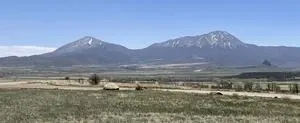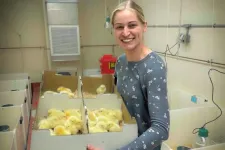(Press-News.org) The role of African women and young people engaged in agricultural service provision has been investigated in a new CABI-led study published in the CABI Agriculture and Bioscience journal.
By combining a literature review with ongoing action research in Kenya, the scientists provide insights into the main characteristics, benefits, and shortfalls of business models for engaging women and young people in agricultural service provision in Africa.
‘Not a panacea to the challenges faced’
The findings show that the engagement of African women and young people in agricultural service provision is ‘not a panacea to the challenges they face’ such as limited decision-making in production and income.
However, the researchers argue that various business models have been successful in contributing to economic empowerment, to increasing entrepreneurial activities and to upskilling of women and young people engaged as service providers.
Business models that are successful, the researchers say, are place-based and people-focused, market-driven and focused on value chains.
Need for multi-sectoral inter-institutional collaboration
Challenges however abound due to various factors. Therefore, for sustainability there is need for multi-sectoral inter-institutional collaboration that pulls in funding and which makes a case for private sector buy-in, they stress.
Women play a significant and increasing role in agriculture in Africa – making up 55% of the workforce. Meanwhile, almost 60% of Africa’s population in 2019 was under the age of 25, making Africa the world’s youngest continent.
Dr Mariam Kadzamira, lead author and Senior Researcher, Agribusiness at CABI, said, “Africa’s women and youth hold the key to the continent’s very survival and the burden to sustain wider global development.
“But they remain on the periphery of decision-making processes, have limited control over productive resources and are predominantly engaged in low paying and/or non-remunerated roles within the sector.
“For sustained and effective engagement of women and young people in agricultural service provision, there is need for multi-sectoral inter-institutional collaboration. This requires long term dedicated funding from governments and development partners.
“Dedicated funding should include components for continuous capacity building as well as provision of low-cost credit for the service providers.”
Multiple skills for potential service providers
She adds that any capacity building programme should budget to provide potential service providers with multiple skills, for them to respond effectively to the evolving needs of their communities, value chains or industry, thus enabling them to earn a sufficient level of income over a cropping season.
Co-author, Dr Monica Kansiime, CABI’s Deputy Director of Development and Outreach for Africa, said, “There is also need for buy-in from industry and the private sector to deliberately incorporate women and young people in their business plans and marketing networks.
“This requires a clear articulation of how the market-driven approach would contribute to the bottom line of the agribusiness while concurrently tapping into a locally available and underutilized human resource.”
The researchers highlight that future research should focus on increasing the evidence base to understand if successes with inclusion of women and young people in agricultural service provision has an influence on agricultural policy.
They also stress a need to rigorously assess the extent to which successful agricultural service business models are engendered – given the prevailing gender gap in the agricultural sector and the fact that service provision in agriculture is still predominantly delivered by men.
Socio-cultural barriers, institutional constraints, and financial bottlenecks
Dr Kadzamira added, “Such research should aim to contribute to the identification of comprehensive strategies for training and engagement of women, young or otherwise, as agricultural service providers and for increasing women’s access to agricultural services once they are made available.
“This research should also aim to understand how promoters can work to overcome the socio-cultural barriers, institutional constraints and financial bottlenecks that make it harder for women to enter or to stay in agriculture service provision in Africa.”
The researchers conclude by suggesting there is need for robust transdisciplinary research to ground truth the various insights emerging from the action research reported in this study as well as similar numerous efforts available as grey literature.
Dr Kansiime added, “Focus should be on quantifying actual renumeration to service providers, and clientele’s (farmers) willingness-to-pay for services rendered by local women and youth versus their willingness-to-pay for services rendered by other service providers.
“There is also a need to measure and quantify impacts at farmer level of the engagement of women and young people as agricultural service providers.”
Additional information
Main image: Study shows that the engagement of African women and young people in agricultural service provision is ‘not a panacea to the challenges they face’ such as limited decision-making in production and income (Credit: CABI).
Full paper reference
Kadzamira, M., Chege, F., Suntharalingam, C., Mary Bundi, M., Likoko, L., Magero, D., Romney, D., Kansiime, M., and Mulema, J., ‘African women and young people as agriculture service providers – business models, benefits, gaps and opportunities,’ CABI Agriculture & Bioscience, 4 March 2024, DOI: https://doi.org/10.1186/s43170-024-00229-y
The paper can be read full open access here.
END
Role of African women and young people in agricultural service provision investigated in new CABI-led study
The role of African women and young people engaged in agricultural service provision has been investigated in a new CABI-led study published in the CABI Agriculture and Bioscience journal.
2024-03-04
ELSE PRESS RELEASES FROM THIS DATE:
26th International Conference of the Redox Medicine Society Set for June 2024 in Paris, France
2024-03-04
The Redox Medicine Society (RMS) is pleased to announce the 26th International Conference of the Redox Medicine, taking place from June 27 to June 28, 2024, in Paris, France. Redox Medicine 2024 will gather the world’s leading experts in redox biology, signaling pathways, and their impact on medicine, promising to highlight the current and future state of Redox Medicine.
The influence of redox processes, redox biology, and redox signaling pathways extends across a broad spectrum of physiological and pathological phenomena. A deeper comprehension of the cellular and molecular mechanisms driving these redox interactions is pivotal for the development of innovative ...
Geologists explore the hidden history of Colorado’s Spanish Peaks
2024-03-04
If you’ve driven the mostly flat stretch of I-25 in Colorado from Pueblo to Trinidad, you’ve seen them: the Spanish Peaks, twin mountains that soar into the sky out of nowhere, reaching altitudes of 13,628 and 12,701 feet above sea level.
In a new study, geologists from the University of Colorado Boulder have laid out a timeline for the emergence of these majestic but isolated mountains. The team’s findings could bring scientists closer to answering one of the most enduring puzzles in Colorado geology: What made ...
Webb unlocks secrets of one of the most distant galaxies ever seen
2024-03-04
Looking deeply into space and time, two teams using NASA’s James Webb Space Telescope have studied the exceptionally luminous galaxy GN-z11, which existed when our 13.8 billion-year-old universe was only about 430 million years old.
Initially detected with NASA’s Hubble Space Telescope, this galaxy — one of the youngest and most distant ever observed — is so bright that it is challenging scientists to understand why. Now, GN-z11 is giving up some of its secrets.
Vigorous Black Hole Is Most Distant Ever Found
A team studying ...
3D-printed skin closes wounds and contains hair follicle precursors
2024-03-04
UNIVERSITY PARK, Pa. — Fat tissue holds the key to 3D printing layered living skin and potentially hair follicles, according to researchers who recently harnessed fat cells and supporting structures from clinically procured human tissue to precisely correct injuries in rats. The advancement could have implications for reconstructive facial surgery and even hair growth treatments for humans.
The team’s findings published today (March 1) in Bioactive Materials. The U.S. Patent and Trademark ...
Discovered a RNA molecule that helps prevent DNA replication errors
2024-03-04
Researchers at Cima Universidad de Navarra have discovered that a ribonucleic acid that does not contain information to make proteins (long non-coding RNA) plays a crucial role in signalling and repairing errors in DNA replication during cell division. This finding could lead to the development of new anti-tumour therapies.
Scientists have identified an RNA that they named 'lncREST' (long non-coding RNA REplication STress) and uncovered its role in triggering an effective response to the stress induced by rapid cell division. "LncREST localises ...
Small and overlooked: Amount of repetitive DNA in blood hints at cancer early
2024-03-04
FOR IMMEDIATE RELEASE
People with cancer have different amounts of a type of repetitive DNA — called Alu elements — than people without cancer. Now, machine learning can measure that from a blood draw. Researchers at the Johns Hopkins Kimmel Cancer Center have used this finding to improve a test that detects cancer early, validating and reproducing the results by starting with a sample size tenfold larger than typical of such types of studies.
The research was published Jan. 24 in the journal Science Translational Medicine.
Alu ...
Study determines the original orientations of rocks drilled on Mars
2024-03-04
As it trundles around an ancient lakebed on Mars, NASA’s Perseverance rover is assembling a one-of-a-kind rock collection. The car-sized explorer is methodically drilling into the Red Planet’s surface and pulling out cores of bedrock that it’s storing in sturdy titanium tubes. Scientists hope to one day return the tubes to Earth and analyze their contents for traces of embedded microbial life.
Since it touched down on the surface of Mars in 2021, the rover has filled 20 of its 43 tubes with cores of bedrock. Now, MIT geologists have remotely determined a crucial property of the rocks collected to date, which will help scientists answer key questions about the planet’s ...
Illinois study: Supporting disease-challenged broiler chickens through nutrition
2024-03-04
URBANA, Ill. — When broiler chickens are busy fighting the parasitic infection coccidiosis, they can’t absorb nutrients efficiently or put energy toward growth. With consumer sentiment pitted against antimicrobials and other drugs, producers still have some options to ensure optimal growth during inevitable outbreaks. New research from the University of Illinois Urbana-Champaign suggests diet changes might help.
“Vaccines and anticoccidials are the traditional ways to prevent this disease. Nutrition can't replace all of the pharmaceuticals, but it can be supportive in providing care,” said senior study author Ryan Dilger, ...
Communities severed by roads and traffic experience a larger number of collisions in New York City
2024-03-04
March 4, 2024- New York City neighborhoods with disrupted community connections, due to traffic, roads, and transport infrastructure, are experiencing an increase in traffic collisions. This increase is seen both in total collisions and for those in which pedestrians or cyclists are injured or killed, according to a new study from Columbia University Mailman School of Public Health. The findings are reported in the journal Environment International.
“Despite recent remarkable progress, road safety remains an urgent urban issue in New York and other U.S. cities. It is important to understand how the spatial configuration of the city enhances ...
Study shows new class of antivirals that works against SARS-CoV-2
2024-03-04
EDMONTON — A University of Alberta research team has uncovered a new class of drugs with the potential to prevent or treat infections in a future viral outbreak.
In the paper, published this week in Nature, the team reports that SARS-CoV-2 — the virus that causes COVID-19 — activates a pathway in cells that stops the production of peroxisomes and interferon, key parts of the normal immune response. The team successfully tested a new class of antiviral drugs that stimulate interferon production to reverse that effect.
Tom ...
LAST 30 PRESS RELEASES:
Effectiveness of exercise to ease osteoarthritis symptoms likely minimal and transient
Cost of copper must rise double to meet basic copper needs
A gel for wounds that won’t heal
Iron, carbon, and the art of toxic cleanup
Organic soil amendments work together to help sandy soils hold water longer, study finds
Hidden carbon in mangrove soils may play a larger role in climate regulation than previously thought
Weight-loss wonder pills prompt scrutiny of key ingredient
Nonprofit leader Diane Dodge to receive 2026 Penn Nursing Renfield Foundation Award for Global Women’s Health
Maternal smoking during pregnancy may be linked to higher blood pressure in children, NIH study finds
New Lund model aims to shorten the path to life-saving cell and gene therapies
Researchers create ultra-stretchable, liquid-repellent materials via laser ablation
Combining AI with OCT shows potential for detecting lipid-rich plaques in coronary arteries
SeaCast revolutionizes Mediterranean Sea forecasting with AI-powered speed and accuracy
JMIR Publications’ JMIR Bioinformatics and Biotechnology invites submissions on Bridging Data, AI, and Innovation to Transform Health
Honey bees navigate more precisely than previously thought
Air pollution may directly contribute to Alzheimer’s disease
Study finds early imaging after pediatric UTIs may do more harm than good
UC San Diego Health joins national research for maternal-fetal care
New biomarker predicts chemotherapy response in triple-negative breast cancer
Treatment algorithms featured in Brain Trauma Foundation’s update of guidelines for care of patients with penetrating traumatic brain injury
Over 40% of musicians experience tinnitus; hearing loss and hyperacusis also significantly elevated
Artificial intelligence predicts colorectal cancer risk in ulcerative colitis patients
Mayo Clinic installs first magnetic nanoparticle hyperthermia system for cancer research in the US
Calibr-Skaggs and Kainomyx launch collaboration to pioneer novel malaria treatments
JAX-NYSCF Collaborative and GSK announce collaboration to advance translational models for neurodegenerative disease research
Classifying pediatric brain tumors by liquid biopsy using artificial intelligence
Insilico Medicine initiates AI driven collaboration with leading global cancer center to identify novel targets for gastroesophageal cancers
Immunotherapy plus chemotherapy before surgery shows promise for pancreatic cancer
A “smart fluid” you can reconfigure with temperature
New research suggests myopia is driven by how we use our eyes indoors
[Press-News.org] Role of African women and young people in agricultural service provision investigated in new CABI-led studyThe role of African women and young people engaged in agricultural service provision has been investigated in a new CABI-led study published in the CABI Agriculture and Bioscience journal.










